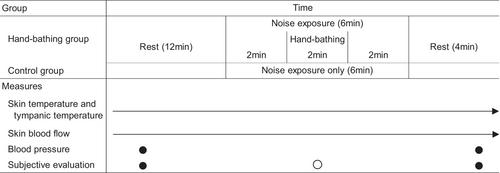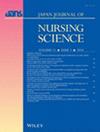Effects of hand-bathing on noise-induced vasoconstriction: A randomized controlled trial
Abstract
Aim
This study assessed the effects of hand-bathing on sympathetic nervous activity exacerbated by psychological stress. Participants immersed one hand in warm water for 2 min while exposed to noise, and changes in blood flow and skin temperature of the non-immersed hand were observed.
Methods
Twenty-nine healthy university students aged 20 years or older were randomly assigned to either the hand-bathing group (n = 14) or the control group (n = 15). After a brief rest in a quiet environment, participants were exposed to noise for 6 min. Those in the hand-bathing group submerged their left hand in a 40°C thermostatic bath for 2 min, starting 2 min into the noise exposure. The tympanic temperature, blood flow, and skin temperature of the non-immersed hand were continuously measured, along with blood pressure and subjective evaluations before and after the noise exposure.
Results
Both groups experienced a decrease in fingertip skin temperature at the start of the noise exposure, persisting longer in the control group. Conversely, the hand-bathing group showed increased fingertip skin temperature after 150 s, significantly higher after the noise exposure than the control group (p = .04). Participants in the hand-bathing group reported significantly increased overall body warmth, thermal comfort, and relaxation during hand-bathing (p = .007, p = .01, p < .001).
Conclusions
The 2-min hand-bathing intervention reversed the pronounced vasoconstrictive response induced by noise exposure and elicited heightened sensations of overall body warmth, thermal comfort, and relaxation. Hand-bathing may mitigate heightened sympathetic nervous activity associated with psychological stress induced by noise exposure.


 求助内容:
求助内容: 应助结果提醒方式:
应助结果提醒方式:


